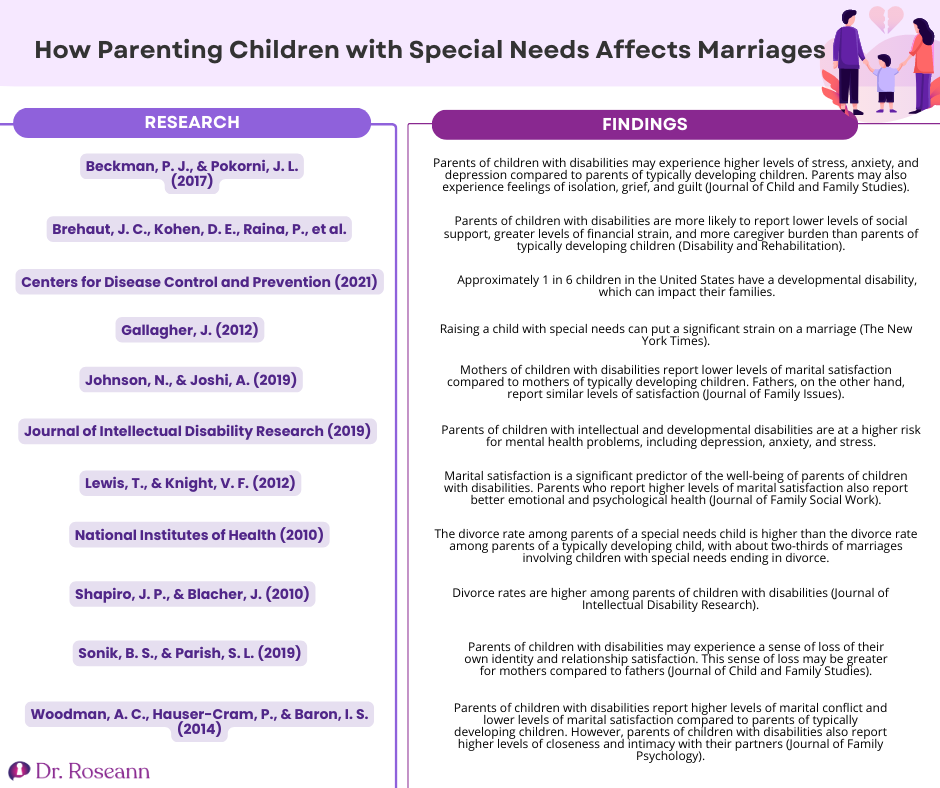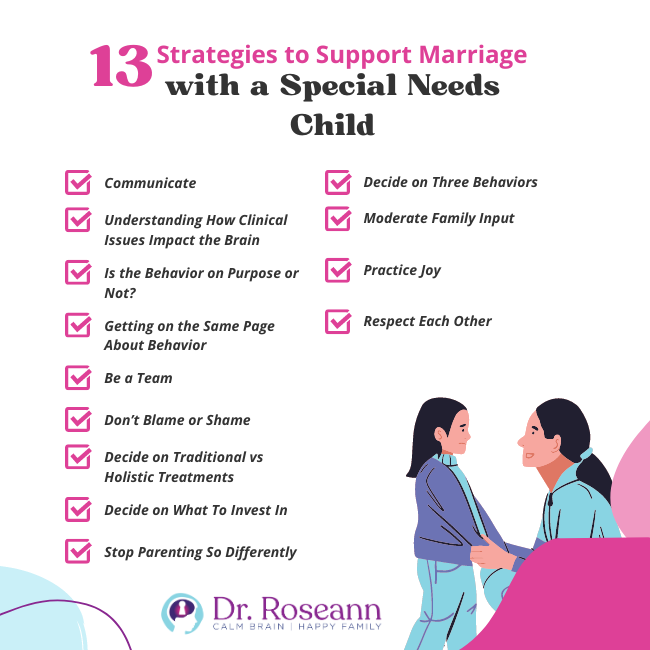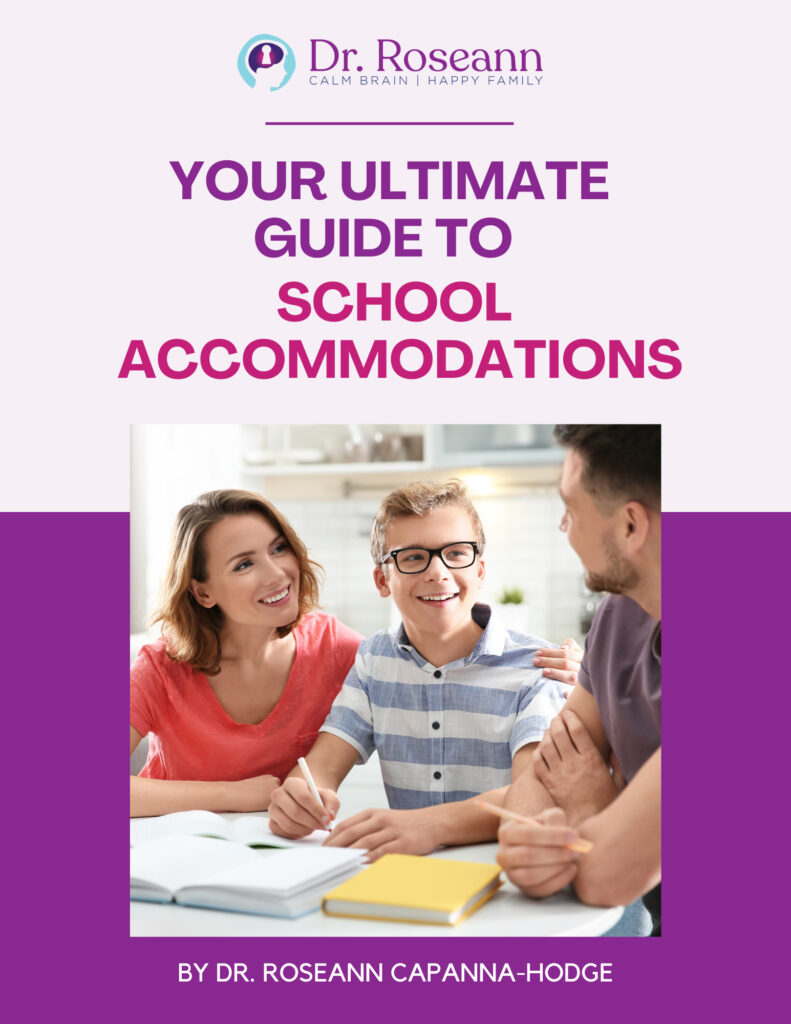Raising a child with special needs can be a challenging journey that requires patience, understanding, and an enormous amount of love. It is a journey that can bring a family together and make them stronger, but it can also significantly strain a marriage.
According to a study by the National Institutes of Health (2010), the divorce rate among parents of a special needs child are higher than that among parents of a typically developing child. It's been reported that about two-thirds of marriages involving children with special needs end in divorce. However, with the right strategies and support, it is possible to strengthen your marriage while raising a child with special needs.
About 80 percent of the parents who walk in my door don't see their child's issues similarly. It doesn't matter if it is ADHD, anxiety, OCD, or PANS/PANDAS. Trying to identify why the problem is happening and how to treat it can tear a marriage apart.
There are things that couples can and should do, and we need to discuss them more openly because having a child with challenges is oh so very hard.
How Your Child's Behavior Can Affect Your Marriage
Children with special needs or mental health issues may experience behavior problems that can be difficult for parents to manage. The stress and anxiety that come with parenting a child with a disability can be a source of conflict in the marriage.
William and Sandy were so at odds over their son’s ADHD that they could barely talk about anything else in their first meeting with me. Dad kept getting stuck on what Mickey needed to, “Learn to be polite” and just couldn’t understand that his brain was driving the impulsive behavior. After explaining the QEEG brain map and giving him our 30-day behavior plan, it was only then that he realized that he was stuck in a behavioral pattern but could learn another way.
Ultimately, couples may have different opinions on managing the behavior, leading to disagreements and tension. It is pretty easy to feel disconnected and like they are not on the same page. The more time they spend trying to manage the behavior, the less time they spend on their relationship, which makes both mom and dad feel overwhelmed and disconnected.
How Do Children Negatively Affect Your Marriage?
According to a study published in the Journal of Intellectual Disability Research (2019), parents of children with special needs are at a higher risk for mental health problems, including depression, anxiety, and stress. It can lead to tension and disagreements in the marriage.
The added financial burden of raising a child with special needs can also add to the stress and strain on the marriage. Additionally, parents of special needs children may feel isolated and disconnected from friends and family members who don't understand what they are going through.
Signs That Your Child’s Behavior is Harming Your Marriage
Marriage can be challenging under the best of circumstances, but when you have a child with special needs, it can be even more difficult. Raising a child with special needs can put a tremendous strain on your marriage, as you navigate the unique challenges that come with this type of parenting.
It's important to recognize the signs that your child's behavior may harm your marriage, so you can take steps to address the issue and strengthen your relationship.
Here are some common signs that your child's behavior may be causing problems in your marriage:
- Your arguing about what is causing the behavior
- Your arguing about how to manage the behavior
- Have trouble communicating with your partner without blame, anger, defensiveness, or frustration
- You disagree that your child has a clinical issue
- You or your partner avoid being at home and find excuses to stay away
- You only talk about the kids
- Your child’s needs are so consuming that you have “nothing” left for yourself or your partner
- You or your partner are developing unhealthy habits to deal with the stress
Marriage can be challenging, but it's important to remember that marriage is the family's foundation. Therefore, it's essential to strengthen your marriage to help you better manage the challenges of raising a hard to manage or complex child.
How Does Parenting Children with Disabilities Affect Marriage?
If you have a child with ADHD, autism, anxiety, depression, OCD, PANS/PANDAS or other increasingly common issues, then you already know that raising a child with behavioral issues, mental health issues or special needs can be tough on a marriage.
Parents of a child with mental health or special needs are more likely to experience mental health problems like anxiety, depression, and stress. Of course that is the case because worrying and managing your child’s behavior, it is a lot! This can add extra pressure on the marriage, especially when coupled with the financial strain that often comes with raising a child who needs a lot of treatments and therapies.
Jenn and Chase were not seeing eye to eye on treating their daughter’s PANS. Chase didn’t get that the in-network providers were going to be a waste of time and money, as well as cause Lizzie to suffer longer. Jenn had done all of the legwork and until Chase joined our FB community, he didn’t realize how hard it was to get expert care. Once he did, it opened up some really good conversations and brought them closer.
That's why it's crucial for parents to seek out support and resources to help them manage the challenges they face. It is also important to remember, you have to fill your cup too all while being the ship’s captain! This is a marathon not a sprint, so self-care and couple care can go a long way in creating a calm family.
Statistics on Special Needs Families
According to the Centers for Disease Control and Prevention (CDC), approximately 1 in 6 children in the United States have a developmental disability. It means that millions of families are raising children with special needs.
How Parenting Children with Special Needs Affects Marriages

How Does Autism Affect Marriage?
Autism is a complex neurological disorder that can have a significant impact on families. Parents of children with autism often face unique challenges when it comes to managing their child's behavior.
Download The Ultimate Guide to School Accommodations to Become Your Child’s Best Advocate
➡️ Get the ultimate accommodations guide that has all of “the meat and none of the potatoes” with accommodations for more than 30 common issues and conditions
➡️ The exact accommodations you need for any school meeting or letter from a seasoned school psychologist and IEP and 504 meeting veteran
➡️Come prepared with the accommodations requests that actually can help your child at school
From worrying about how to get children the best school accommodations and special education support to what will happen in the future, autism has its own unique stressors. I have found that the parents of children with autism who function best really communicate well and divide responsibilities. I have several families that I see who have two or more children with autism. I even have a family with four autistic children and they are an amazing team because they communicate and really are on the same page about how to manage autism.
What to Do If Your Child’s Behavior is Ruining Your Marriage
If your child's behavior or mental health issues are causing problems in your marriage, there are steps you can take to address the issue and strengthen your relationship.
13 Strategies to Support Marriage with a Special Needs Child

Communicate
It's essential to communicate with your partner in all areas and not just about your child. When communication breaks down, boy can things get ugly. One of my PANS/PANDAS families was so angry with each other, that even when their son, Austin got better, no one could even recognize how much better he actually was.
Understanding How Clinical Issues Impact the Brain
It's important to understand exactly how the clinical issue affects your child's brain and behavior. For parents in our program, we show them exactly what areas of the brain are dysregulated and create a care plan that supports brain and behavioral change. Both parents hearing and understanding what is going on first hand is a key component in the marriage too.
Is the Behavior on Purpose or Not?
Understanding the nature of your child's behavior can help you develop more effective strategies for managing it. So many parents who come to see me are so divided on this one point. Most behavior isn’t on purpose and the quicker you realize that, the quicker you can shape desired behavior.
Getting on the Same Page About Behavior
Discussing and agreeing on how to manage your child's behavior is crucial for avoiding disagreements and tension. Even if you have different opinions on how to manage the behavior, you have to find a common ground. I find that once parents understand exactly what is going on in their child’s brain, everything changes.
Be a Team
Remember that you and your partner are a team, and it's essential to work together to manage your child's behavior effectively. That also means getting a plan together about treatment, school support, and managing extended family.
Don’t Blame or Shame
Blaming or shaming your partner will only lead to further tension and conflict. It's important to focus on what each partner is doing to help the situation and lean into that.
Decide on Traditional vs Holistic Treatments
When parents come to me, how to treat the issue (aka, to medicate or not) is a huge point of parent conflict. Once parents realize what they are doing isn’t working and can actually harm the brain, then choosing a science-based, natural approach is an easy choice.
Decide on What To Invest In
Raising a child with special needs can be expensive, and the added financial burden can add stress to the marriage. It's important to discuss what treatments you want to invest in and how long you plan on doing them. Many parents reach for medications because they believe that they are the less expensive option but that often isn’t the case and they can come with many dangerous side effects.
Stop Parenting So Differently
One parent can't have an attachment style of parenting and the other parent uses an authoritarian parenting style. It is just too confusing for a child. I recently had divorced parents who exemplified this and when I asked dad why he was so harsh, dad said, “He is such a baby that I have to stop him from being stupid and lazy.” While this may be an extreme example, parenting very differently doesn’t support learning.
Decide on Three Behaviors
Don’t try to chase down every behavior. Decide on no more than three behaviors (one is what I recommend to my families in our program) and make a written plan on how you will address it.
Moderate Family Input
While it's important to involve other family members in your child's care and management, it is also important to limit their input into how you are managing your child’s issues. If grandparents, aunts, uncles, etc. aren’t helping the situation, then you can limit their involvement.
Practice Joy
Take time to enjoy each other and your family. Schedule date nights and find simple ways to spend time together as a family. Focus on the positives, no matter how small. I recently worked with a family for two weeks in our BrainBehaviorReset™ Program where we had to retrain the whole family to break their brain’s negativity bias. It was only then that we could get their daughter’s OCD under control.
Respect Each Other
Parents may have different perspectives on the issues their child is facing. It's important to respect each other's opinions and work together to find a solution and I find that when they understand the issues after having a QEEG Brain Map, parents can do that.
Raising a child with special needs can be challenging, but it doesn't have to ruin your marriage. By recognizing the signs that your child's behavior may be harming your marriage, and by taking steps to address the issue and strengthen your relationship, you can create a strong and happy marriage that can weather any storm.
Remember to take care of yourself along the way. As I always tell my parents, “This is a marathon, not a sprint!”
Wrap Around Support For Parents and Children with Special Needs
With today’s antiquated mental health system, the journey can be especially hard. If you are looking for more personalized solutions for your child and family, then take our solution matcher to find out what can help you right now.
Mickey’s parents were not only able to come together in managing his ADHD, they learned how to manage his behaviors without shame or blame. In our BrainBehaviorReset™ Program, we helped Mickey’s brain regulate and calm, so he was much less impulsive. With his parents' newfound understanding of how his brain learned and how they could shape and reinforce behaviors, Mickey was able to gain the ability to put the brakes on before he took action.
When your child is struggling, finding your tribe is also important, so joining our free natural parenting community to get support is an easy step in the right direction.
Citations:
Beckman, P. J., & Pokorni, J. L. (2017). Parenting stress of parents of children with disabilities: A review of family systems literature. Journal of Child and Family Studies, 26(7), 1985-1997. https://doi.org/10.1007/s10826-017-0718-1
Brehaut, J. C., Kohen, D. E., Raina, P., et al. (2011). The health of primary caregivers of children with cerebral palsy: How does it compare with that of other Canadian caregivers? Pediatrics, 127(6), e1312-e1320. https://doi.org/10.1542/peds.2010-2747
Centers for Disease Control and Prevention. (2021). Data and statistics on children's developmental disabilities. https://www.cdc.gov/ncbddd/developmentaldisabilities/data.html
Gallagher, J. (2012, October 15). Autism's effect on marriage. The New York Times. https://www.nytimes.com/2012/10/16/health/autisms-effect-on-marriage.html
Johnson, N., & Joshi, A. (2019). The effects of having a child with a disability on marital satisfaction: Gender differences. Journal of Family Issues, 40(16), 2318-2344. https://doi.org/10.1177/0192513X19868928
Journal of Intellectual Disability Research. (2019). Mental health of parents of children with intellectual disability in Bangladesh. Journal of Intellectual Disability Research, 63(12), 1456-1468. https://doi.org/10.1111/jir.12681
Lewis, T., & Knight, V. F. (2012). Marital satisfaction and parent-child relationships: Effects on family cohesion. Journal of Family Social Work, 15(1), 36-47. https://doi.org/10.1080/10522158.2011.627378
National Institutes of Health. (2010). Divorce rates among parents of children with special needs. National Institutes of Health News Releases. https://www.nih.gov/news-events/news-releases/divorce-rates-among-parents-children-special-needs
Shapiro, J. P., & Blacher, J. (2010). Divorce among parents of children with disabilities: A review. Journal of Intellectual Disability Research, 54(5), 367-376. https://doi.org/10.1111/j.1365-2788.2010.01277.x
Sonik, B. S., & Parish, S. L. (2019). The marital relationship and child behavior outcomes in families of children with autism. Journal of Child and Family Studies, 28(4), 1094-1104. https://doi.org/10.1007/s10826-018-1298-8
Woodman, A. C., Hauser-Cram, P., & Baron, I. S. (2014). Parenting stress and closeness: Mothers and fathers of children with developmental disabilities. Journal of Family Psychology, 28(6), 802-810. https://doi.org/10.1037/fam0000026
Always remember… “Calm Brain, Happy Family™”
Are you looking for SOLUTIONS for your struggling child or teen?
Dr. Roseann and her team are all about solutions, so you are in the right place!
There are 3 ways to work with Dr. Roseann:
You can get her books for parents and professionals, including: It’s Gonna Be OK™: Proven Ways to Improve Your Child’s Mental Health, Teletherapy Toolkit™ and Brain Under Attack: A Resource For Parents and Caregivers of Children With PANS, PANDAS, and Autoimmune Encephalopathy.
If you are a business or organization that needs proactive guidance to support employee mental health or an organization looking for a brand representative, check out Dr. Roseann’s media page and professional speaking page to see how we can work together.
Dr. Roseann is a Children’s Mental Health Expert and Therapist who has been featured in/on hundreds of media outlets including, CBS, NBC, FOX News, PIX11 NYC, The New York Times, The Washington Post,, Business Insider, USA Today, CNET, Marth Stewart, and PARENTS. FORBES called her, “A thought leader in children’s mental health.”

She is the founder and director of The Global Institute of Children’s Mental Health and Dr. Roseann Capanna-Hodge. Dr. Roseann is a Board Certified Neurofeedback (BCN) Practitioner, a Board Member of the Northeast Region Biofeedback Society (NRBS), Certified Integrative Medicine Mental Health Provider (CMHIMP) and an Amen Clinic Certified Brain Health Coach. She is also a member of The International Lyme Disease and Associated Disease Society (ILADS), The American Psychological Association (APA), Anxiety and Depression Association of America (ADAA) National Association of School Psychologists (NASP), International OCD Foundation (IOCDF) International Society for Neurofeedback and Research (ISNR) and The Association of Applied Psychophysiology and Biofeedback (AAPB).
© Roseann-Capanna-Hodge, LLC 2023
Disclaimer: This article is not intended to give health advice and it is recommended to consult with a physician before beginning any new wellness regime. *The effectiveness of diagnosis and treatment vary by patient and condition. Dr. Roseann Capanna-Hodge, LLC does not guarantee certain results.














